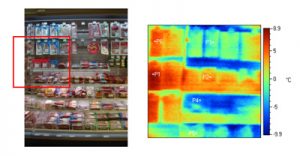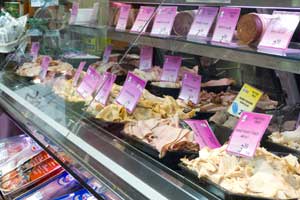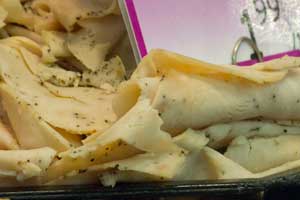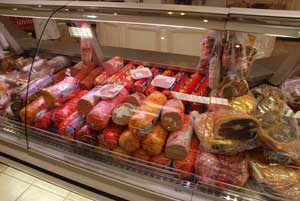Refrigerated Delicatessen Luncheon Meats in Commercial Merchandisers

Radiation from deli display lighting raises the surface temperature of lunch meat even when the meat is covered with transparent wrapping and displayed in refrigerated delicatessen cases equipped with humidifiers.
One study found internal temperatures of 10°C to 14°C (50°F to 57.2°F) in 85% of the lunch meats on display, well above the recommended maximum internal temperature of 4°C (39°F). These high temperatures dehydrate and discolor the meat, and accelerate bacterial growth which leads to spoilage.
Promolux balanced spectrum fluorescent lamps and LEDs emit lower levels of heat and ultraviolet radiation than regular supermarket fluorescent lamps, thus protecting deli meat from drying out.
Dehydration of Refrigerated Deli Luncheon Meat Displays

When roasted deli meat such as roast beef or turkey and processed deli lunch meats such as bologna are sliced on demand at deli service counters, the first slice is often thrown away because the outside layer of the deli meat is dry. This soon becomes costly for the deli.
Bulk foods within service counters are not well protected from the light, but they are monitored regularly by deli staff. Pre-sliced luncheon meat at service counters are very vulnerable to dehydration and discoloration, particularly presliced ham and other cured and processed meats, and the slices need to be shuffled to keep them from drying out and fading.
We have installed Promolux lamps in our Produce, Meat and Deli departments. It really brings out the natural colors that other lamps seem to wash away. They make everything look great.
Robert Lamonica, Store Owner, IGA Haberfield NSW
Spoilage of Refrigerated Deli Luncheon Meat Displays

Heat and UV radiation from delicatessen display case lighting can cause deli lunch meats to spoil. Processed and cured lunch meats containing herbs such as oregano and roasted deli meats that are coated with pepper or other spices are particularly vulnerable to spoilage because herbs and spices are photosensitive. Chlorophyll absorbs radiated light, accelerating the decomposition of the herbs and spices and increasing bacterial growth on nearby meat surfaces.
In the past, dyes and additives were used to prevent meat from spoiling and discoloring, but strong preservatives are no longer being added to deli meats, reducing the shelf life of deli meat. The ideal shelf life of processed deli lunch meats can vary depending upon what spices and preservatives were added to the meat, how it was processed, and how it was packaged.

Compared to other fluorescent lighting, Promolux lamps and LED lighting emit 86% lower UV B radiation and 52% lower UV A radiation so deli meat has a longer shelf life and fresh color and appearance.
Promolux Deli Meat Showcase LEDs and Fluorescent Lamps
Promolux balanced spectrum lamps and LEDs are engineered specifically to help prolong the shelf life of delicatessen foods especially shaved and cured meats. Compared to other fluorescent lighting, Promolux lamps emit very little heat and were constructed just for fresh food displays.
Promolux lamps are more than just a food lamp, they are designed to complement a stores’ merchandising program through the safe illumination of the case without sacrificing color presentation.
